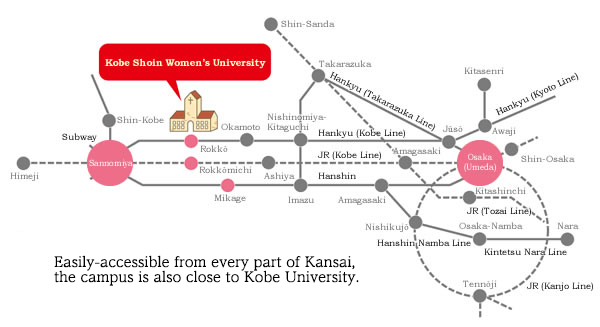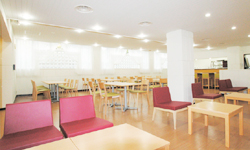General Information
Since being founded in 1892 in Kitano-cho, Kobe City (Hyogo Prefecture) as the "Shoin School for Girls" by missionaries of the Anglican Church, Kobe Shoin Women's University has been a pioneering educational institute for women that has built up its history and traditions. Today, the beautiful brick university buildings in Nada Ward, Kobe City are in a wonderful location that is enveloped in green surrounds and commands a panoramic view of the ocean.
The potential of our students is nurtured in the positive and free academic culture of the University, and they become versatile communicators which allows them to be successful in society after graduation. The employment rate of our graduates is high and many of them are successful in a number of employment fields.
Small class sizes are characteristic of the education at the University, and this enables students to devote themselves to study in a homelike atmosphere where they feel very close to the teaching staff. After classes have finished, there are also a variety of lively club and volunteer activities organized by students.
| [Location] | 1-2-1 Shinoharaobanoyama-cho, Nada Ward, Kobe City |
|---|---|
| [Faculties and Departments] | Faculty of Letters Department of English: English Professional Studies Program, Global Communication Program Department of Japanese Language and Culture |
| Faculty of Human Sciences Department of Psychology, Department of Urban Life Studies Department of Food Science and Human Nutrition Department of Fashion & Housing Design |
|
| Faculty of Education Department of Education: Early Childhood Education Program, School Education Program |
|
| [Education Philosophy] | Christian spirit…The Christian spirit of compassion for others Practical education…The fusion of in-depth educational knowledge and a wide range of pragmatic skills Career education…Live a life that is rich in individuality and unique to oneself |
We accept international students at Kobe Shoin Women's University (please note this does not apply to the Department of Food Science and Human Nutrition and the Department of Education). The entrance exam for foreign applicants takes place in December.
History
Kobe Shoin Women's University is proud of its history and tradition. With three faculties and seven departments, Kobe Shoin Women's University provides a liberal arts education and has succeeded since its inception in developing students based on a Christian ethos.
The school is located in Kobe, a cosmopolitan city surrounded by mountains and the sea with a sophisticated style of everyday living. It aims to develop young women into well-rounded adults with international sensibilities. While teaching at Kobe Shoin Women's University is grounded in Kyōyō-shugi (a Japanese creed or "ism" of personality development that emerged among Japanese intellectuals at the end of the Meiji Era), the University seeks to nurture the practical intelligence our current times demand and to develop the personal qualities of each individual student in a free academic culture.
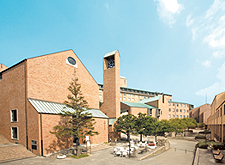
- 1892
- Shoin School for Girls was founded in the Kitano district of Kobe City by a missionary arm of the Anglican Church.
Its record as a missionary school was initially marked by the conduct of classes focusing on important subjects for women in the Meiji Era such as sewing - both Japanese-style and Western - and English. - 1915
- Shoin Girl's Senior High School was established.
- 1929
- The Aotani district of Kobe City was selected for the school grounds. The ground-breaking ceremony was attended by Prince Henry, Duke of Gloucester. The new school buildings opened in December.
- 1947
- The predecessor of the University and Junior College, Shoin Women's Vocational College, was established. The inaugural president was Isamu Asano.
- 1950
- Shoin Women's Vocational College was re-inaugurated as Shoin Junior College following educational system reform. Departments of Christianity and English Literature were established. The inaugural president was Arthur Lee. Subsequently, Departments of Clothing, Domestic Science, and Japanese Literature were added.
- 1966
- Shoin Women's University was established in Tarumi Ward, Kobe City. Departments of English and American Literature, Japanese Literature, and Christianity were included in the Faculty of Letters. The inaugural president was Dr. Hinsuke Yashiro.
- 1980
- The first phase of construction of the new school building in Rokko was completed. The Junior College was relocated from Aotani.
The second phase of construction was completed in 1981, and the University was relocated from Tarumi. - 1982
- Celebration of 90th anniversary of the school's founding.
- 1983
- Pipe organ installed in the chapel.
- 1986
- The Junior College Department of English Literature established major courses of study in English Language and English Literature. Similarly, the Department of Domestic Science began to offer majors in Human Life Science as well as Nutrition.
- 1991
- Change of names of the Department of Clothing and the Department of Domestic Science to the Department of Human Life and Art & Design, and the Department of Human Life Science, respectively.
- 1992
- Change of name of the University Department of English and American Literature to the Department of English.
Celebration of the 100th anniversary of the school's founding. - 1995
- Change of name of Shoin Women's University to Kobe Shoin Women's University and of Shoin Women's Junior College to Kobe Shoin Women's Junior College.
- 2000
- The Kobe Shoin Graduate School of Letters (master's program) was established with two majors: English Language, and Japanese Language and Literature. The Department of Literary Arts was added to the University's Faculty of Letters.
Change of name of the Junior College's Department of English Literature to the Department of English Language Communication. - 2001
- The Department of Psychology was added to the University's Faculty of Letters.
- 2002
- A doctoral program in Linguistic Science was established in the Kobe Shoin Graduate School of Letters.
Celebration of 110th anniversary of the school's founding. - 2004
- A master’s program in Psychology was added to the Kobe Shoin Graduate School of Letters. The Department of Psychology of the University's Faculty of Letters was reorganized as the Department of Psychology of the University's Faculty of Human Sciences.
- 2005
- The Department of Lifestyle Studies with majors in Urban Life Studies and Nutrition was added to the University's Faculty of Human Sciences.
- 2008
- Departments of Child Development and Fashion & Housing Design were added to the University's Faculty of Human Sciences. Recruitment of students for the Junior College was discontinued.
- 2009
- The Department of Child Development, Faculty of Human Sciences was made a Designated Child Care Person Training Institute.
- 2011
- The Department of English and the Department of Japanese Literature were replaced by the newly established Departments of English and of Japanese Language and Culture.
- 2012
- Celebration of 120th anniversary of the school's founding.
- 2014
- The group of buildings that comprise the university campus was awarded the “Long Life Prize” in the 23rd BELCA Awards by the public service corporation “Building and Equipment Long-life Cycle Association”.
- 2015
- The Okamoto Nursery School was established.
- 2017
- Celebration of the 125th anniversary of the school’s founding.
The Department of Urban Life Studies and the Department of Food Science and Human Nutrition were newly established in the Faculty of Human Sciences. - 2019
- The Faculty of Education, Department of Education was established.
- 2021
- The Graduate School of Letters Doctoral Program in Linguistic Science ceased to accept students.
- 2022
- Celebration of the 130th anniversary of the school's founding.
Philosophy and Goals (Educational Policy)
Diploma Policy (Policy on Award of Academic Credentials)
The goal of Kobe Shoin Women's University is to nurture responsible adults capable of contributing to society with a feeling of compassion for others through the education of women founded on the spirit of Christian love. Towards this end, the policy of Kobe Shoin Women's University is to educate its students until graduation in the capacities described below, and then to award those who are successful with bachelor’s diplomas.
1. Knowledge and Understanding
(1)To have correct knowledge of the history of people and their environments, and to be able to understand the role that people should play within society.
(2)To acquire at least one foreign language and to be able to use that language to have sufficient understanding of the existence and value of cultural difference and multiculturalism in today’s globalized and internationalized society.
2. Versatile Skills
(1)Supported by the foundation of a wide-ranging general education, which permits continued learning throughout life, students are expected to bring a broad perspective to their acquisition of professional skills and abilities.
(2)To understand the nature of social issues correctly and, based on a critical mindset, to acquire sufficient communication skill to be able to consider such issues rationally and state personal ideas clearly.
3. Attitude and Direction
(1)While making efforts to establish independence as adults, to not only wish for personal fulfillment but to give back to society and live in harmony with others by applying what has been learned.
(2)To acquire specialist skills and be able to contribute to society with a broad perspective that transcends any narrow specialization.
Curriculum Policy (Policy for Educational Program Formulation and Implementation)
Education at Kobe Shoin Women's University consists broadly of three areas: academic subjects common to the whole University, foreign language subjects and vocational subjects. Reflecting the diploma policy of Kobe Shoin Women's University, the objective of each of these subject areas is as follows:
University-wide, Common Academic Subjects
These subjects instill in students the communication skills necessary to receive and transmit information while also developing student sensibilities in the correct understanding of the spirit of Christian love, tolerance for others and contribution in the community.
Foreign Language Subjects
Through the learning of Japanese and other languages, these subjects deepen a student's understanding of cultural difference and multiculturalism while developing the fundamental skills for living as a responsible adult in a globalized society.
Vocational Subjects
Based on the ability to cultivate flexible and practical skills, these subjects instill expertise in students through the acquisition of knowledge backed by rational thinking and supported by a thorough understanding of human qualities and nature.
Admissions Policy
1. Knowledge and Skills
Kobe Shoin Women’s University does not seek students interested only in fixed concepts, but rather expects new students to be flexible and driven by a spirit of curiosity and to aspire to become actively involved in society.
2. Ability to Think, Make Judgments and Express Oneself
Kobe Shoin Women’s University does not expect its students to be perfectly accomplished as individuals from the moment they enter university, but looks for women who have the potential to develop during their university life.
3. The Will to Learn Independently and Cooperate with Others
Kobe Shoin Women’s University expects students to apply their time at university not only for their own personal improvement, but also in the service and assistance of others in the spirit of Christian love.
Profile of Faculties and Departments
Faculty of Letters
Department of English : English Professional Studies Program, Global Communication Program
Focus: Be at the forefront of global business with world-class English ability and valuable additional skills.
In a global society, acquiring a good balance of the four skills of listening, speaking, reading, and writing is the first step to becoming a truly international person who can play an active role in the world. The Department of English offers two specialized courses to match the content and style of your studies to your career path, and cultivates high-level English language and diverse communication skills.
Department of Japanese Language and Culture
Focus: Understand the essence of Japanese language and culture, and acquire the ability to express yourself and communicate
Students learn the history of the Japanese language, dialects, traditional Japanese culture and literature. Students can acquire correct Japanese language skills and the ability to express their thoughts appropriately and communicate independently. Students also learn about the media that drive society, analyze cultural phenomena in modern Japan, and think about issues in contemporary society.
Faculty of Human Sciences
Department of Psychology
Focus: Understand the human mind to become a psychology specialist, or work in the general business world or in a supporting role
The study of psychology scientifically clarifies the complexities of the human mind and behavior. In the Department of Psychology, students learn widely across the range of psychological fields and acquire practical skills. The ability to approach people and the depths of their minds is useful in a wide range of social situations. In addition, students can aim to become professionals who are active in clinical settings.
Department of Urban Life Studies: Urban Life Studies Program, Food Business Program
Focus: Study food, clothing, housing, economics and management to create new value in an increasingly digital society
People's lives are made up of various elements including food, clothing, shelter, economics, and management. In the digitalized society of the future, it is important to view society from multiple perspectives while utilizing ICT. The goal is for students to acquire the ability to solve problems in their work or daily lives, and become human resources who can contribute to society.
Department of Food Science and Human Nutrition [Registered Dietitian Training Program]
Focus: Aim to become professionals in the field of food and nutrition
As people become more health-conscious, the role of dietitians is becoming increasingly important in a wide range of fields, including hospitals and welfare facilities. Through a curriculum that helps students acquire skills in assessment, management, presentation, collaboration, and production, we nurture individuals with strong practical abilities.
Department of Fashion & Housing Design
Focus: Create new lifestyles through design
The pursuit of beauty requires not only a knowledge of fashion and makeup, but also a total perspective that includes interior design and lifestyle itself. In Kobe, a fashion city with a unique sense of beauty, students can learn design to enrich their lives and acquire the ability to create new values.
Faculty of Education
Department of Education: Early Childhood Education Program, School Education Program
Focus: Learn to become the "teacher" you want to be, and become a caregiver and educator who values the diversity of children
Students can choose to specialize in "Early Childhood Education" or "School Education" based on our experience of training nursery school, kindergarten, and elementary school teachers, as well as junior and senior high school teachers. Through study in a variety of specialized fields, the department seeks to nurture human qualities that enable students to cooperate and collaborate with the community and the wider society.
Campus Facilities
The University campus is enveloped in green surroundings and commands a panoramic view of the ocean. It is also just 15 minutes’ walk from Hankyū Rokkō train station. The campus features a functional arrangement of school buildings, facilities for practical learning, and areas for recreation that encourage a dynamic and relaxed campus life to help students in their studies until graduation.
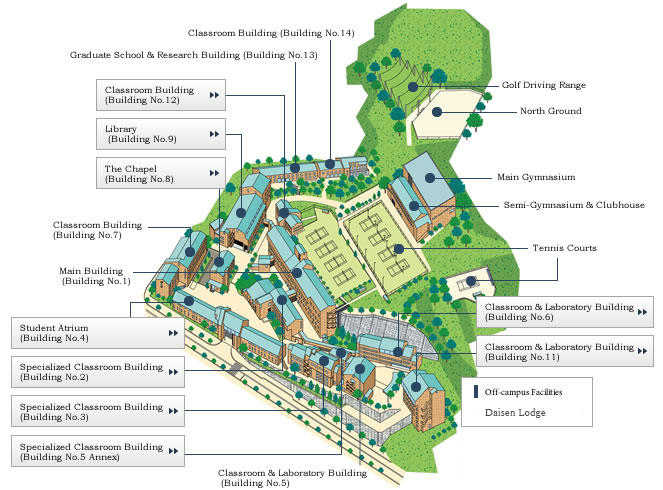
The Chapel (Building No. 8)
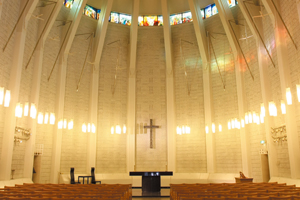
The Chapel on your immediate left as you enter the main gates is the symbol of Kobe Shoin. With its high ceiling, stained glass windows with light streaming through, and the elegant sounds of one of the most distinguished pipe organs in Japan, the chapel's sublime atmosphere is something unexpected and special. Various services and events are held in the chapel, including a noon service, chapel concerts and wedding ceremonies for Kobe Shoin alumni.
Library (Building No. 9)
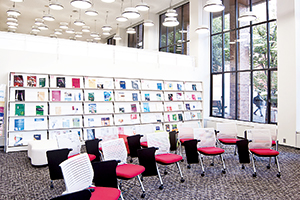
The library holds around 400,000 books and other resources including academic titles, arts and literary titles, and newspapers and magazines, all searchable through the computer network. The library also has an audio-visual corner with DVDs and other educational resources, a fully equipped computer corner, and the Learning Commons “Terrace” used for exhibitions, group studies and preparation for presentations. The key color scheme in the building interior is white, which ensures a bright and tranquil atmosphere.
Specialized Classroom Building (Building No. 2)
Teachers Study Room
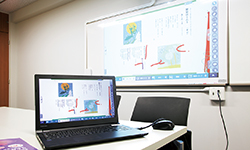
The study room is well stocked with the latest materials relating to the Japanese Teaching Staff Examination and past papers, as well as various study materials including teaching-related textbooks and coaching manuals. The room can be used to do independent study for the Japanese Teaching Staff Examination or other employment exams, or to prepare for and review on-site training or subjects relating to teacher training courses. The room can also be used by students post-graduation.
Teachers Support Room
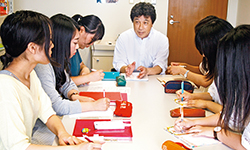
The Teachers Support Room is a place where students can receive support or consultation regarding their studies, teaching, taking the Japanese Teaching Staff Examination and applying for teaching positions, among other topics. To help those wishing to become teachers themselves, the Support Room is staffed by people with real-life experience as school or kindergarten principals, in education roles in government, or as teachers, who are able to consult with and support students with career advice and guidance. The Japanese Teaching Staff Examination is formed of two parts, a general studies examination and a specialist exam (which includes an interview, a mock lesson, and simulated childcare) that so every aspect of a prospective teacher’s proficiency is gauged. At Kobe Shoin, we aim to have every student pass the exam in their final year and, in order to do so, we have seminars that help students with the general studies exam, as well as individual guidance regarding specialist exams or interviews, mock lessons, and practical skills tests.
International Lounge
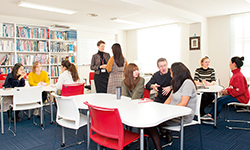
It is used for international exchange events on campus, such as welcome/farewell parties and meetings between foreign students and Japanese students to complete assignments etc.
CL Classroom
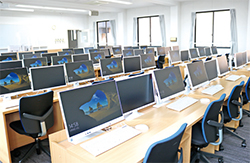
Used to teach English listening, speaking and reading skills as well as interpreting. The room is used for practical English language study and contains many CDs and DVDs.
Active Learning Classroom
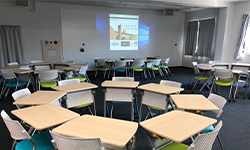
We aim to promote independent learning using ICT.
Specialized Classroom Building (Building No. 3)
Computer Laboratory (Windows)
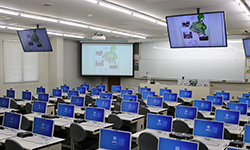
A total of around 200 Windows machines are installed throughout four classrooms. In practical computer classes and also through self study students can study computer operation and technique to a high level of application.
Computer Laboratory (iMac)
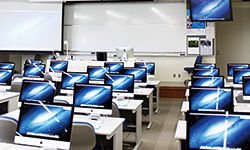
There are 40 Macintosh machines installed for use in learning CG, design, film, linguistics, as well as English Department information education subjects.
Self-Study Computer Rooms (Buildings 3 and 12)
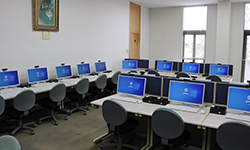
20 PCs are installed for free use in these two buildings. Support staff are available at the Joho Kyoiku Center (Information Education Center) on the fourth floor of the building to help students with reports etc.
Secretarial Training Room
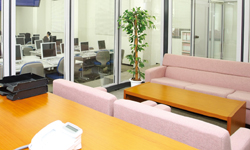
By recreating a corporate reception area or an internal office environment, students are able to learn practical aspects of secretarial work such as dealing with visitors, holding meetings and business manner.
Student Atrium (Building No. 4)
Student Dining Hall
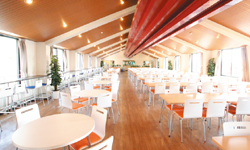
Two bright and attractive dining rooms, Rose Kitchen and Margaret Dining, have a combined capacity of around 550 diners.
MARUZEN Campus Shop
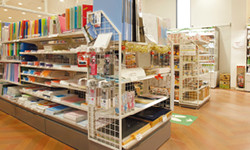
An on-campus convenience store with a full range of stationery, boxed lunches, soft drinks and sweets.
Kobe Shoin Kokoro Care Center
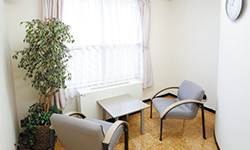
Provides counseling for various mental issues to persons from off-campus. The Center is also used during classes for the Graduate School Psychology major under the direction of a clinical psychologist.
Specialized Classroom Building (Building No. 5 Annex)
Electric Piano Recital Room
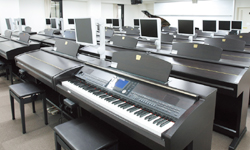
Music room with 30 latest electronic pianos where students of the Department of Education practice.
Science Laboratory
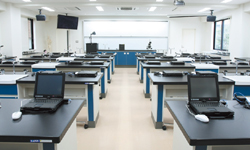
With comfortably spacious laboratory benches, 40 computers and its own electron microscope, students can tackle various experiments in chemistry, physics and biology in the pursuit of a challenging science education.
Chitose Salon
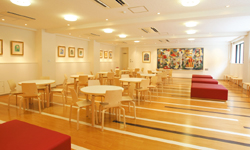
A space for students to gather freely and talk. The area contains tables, chairs, and comfortable sofas. The natural light and Chagall prints on the wall engender a friendly atmosphere.
Community Room
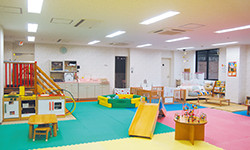
A meeting area open to local parents with children. The Kobe Shoin Parent & Child Free Space (Matsubokkuri) is regularly held here, and students of the Department of Education learn about childcare and child rearing from the real-life experiences of various parents and children.
Classroom & Laboratory Building (Building No. 6)
Drafting Room
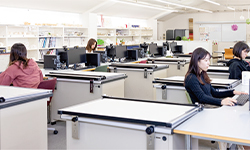
Used for lectures and practical work by the Department of Fashion & Housing Design. Of three rooms, two contain drafting desks with one study-orientated computer for each participating student (CAD applications).
Fashion Production Room
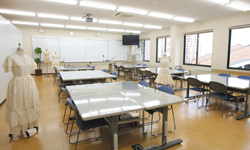
Classroom used for practical work by the Department of Fashion & Housing Design. The room is complete with specialist equipment including textile tools, industrial sewing machines and mannequins.
Food Service Management Training Room
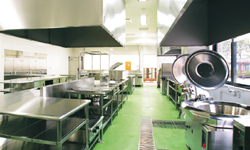
This training room is used to study the running and business management of food service. The room is equipped with facilities and equipment compliant with HACCP standards, an internationally applied system of food safety and hygiene management.
Classroom & Laboratory Building (Building No. 11)
Nutrition Education Training Room
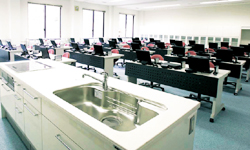
Used mainly for classes and practical training for the Department of Food Science and Human Nutrition. Digital projectors and computers are installed for information gathering and analysis.
Studio
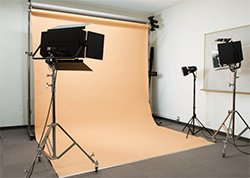
Used mainly for classes and practical work by the Department of Fashion & Housing Design. Contains the equipment and facilities to shoot and edit any kind of media from still photography to high-definition video footage.
Classroom Building (Building No. 12)
Computer Lounge
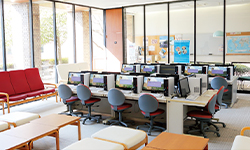
Installed with 20 computers for students to use at any time. Students use the computer lounge between lessons and at other times to compose reports, for self-schooling, and other uses.
English Island
An interactive space for students and native-speaking foreign language educators.
Access
Hankyū "Rokkō" train station, JR "Rokkō-michi" train station and Hanshin "Mikage" train station are all serviced by direct trains from major city districts including Kobe, Sannomiya, Osaka and Umeda. Kobe Shoin is also serviced by a direct bus service from Hankyū "Rokkō" train station and JR "Rokkō-michi" train station during term time.
